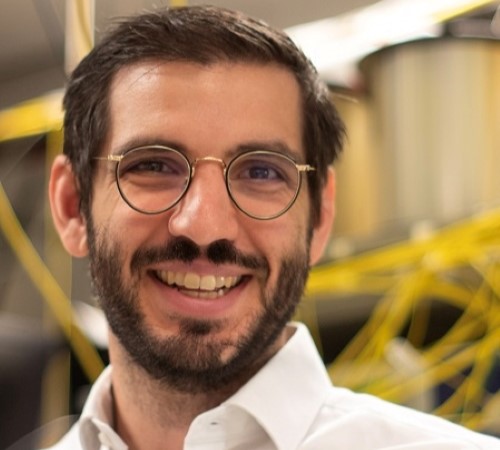Research Fellowships 2024
The digital communication infrastructure underpinning the internet represents 3% of global power usage, and internet traffic is growing by approximately 10% every year. Optical communication systems contribute 30% to this, because of the numerous optical fibre amplifiers used to compensate for signal loss. Dr Eric Sillekens’ Royal Academy of Engineering Research Fellowship proposal is to introduce low-complexity digital signal processing (DSP) This enables the combined use of energy-efficient semiconductor optical amplifiers (SOAs) and hollow core optical fibre (HCF) to create new communication system architectures with significantly lower energy consumption (30–50% reduction in energy/bit).
In HCF, the optical signal propagates through air, in contrast to the solid glass core in optical fibres used today. This offers several key advantages: the optical attenuation of HCF is lower, so lower signal power is needed; the dispersion can be precisely tailored, reducing signal distortion; and, unlike solid core fibre HCF is linear, further reducing signal distortion.

Optical amplifiers deployed today use a two-stage pumping scheme (requiring electrical-to-optical and optical-to-optical conversions). In contrast, SOAs generate gain directly from the electrical input current, saving a conversion step and also power. A key drawback of SOAs is the signal distortion induced by their nonlinear gain dynamics and Dr Sillekens research will investigate how a low-complexity receiver DSP, based on machine learning, can compensate for these distortions. Additionally, introducing low-loss HCF decreases the number of amplifiers needed, while simultaneously simplifying the DSP because of the fibre’s linearity and near-zero dispersion.
To date, SOAs and HCF have been investigated separately (e.g., HCF at Lumenisity, SOAs at Huawei and Nokia). The Fellowship supported research at University College London would, for the first time, explore their combined use, exploiting the relationship between SOAs and HCF made possible through novel DSP for power efficient optical communication.
Related content
View all programmesSupport for research
The Academy runs a number of grants to support excellent researchers carry out engineering activities and to enable clo…
Research Fellowships
The Academy offers Research Fellowships each year to outstanding early-career researchers to support them to become fut…
